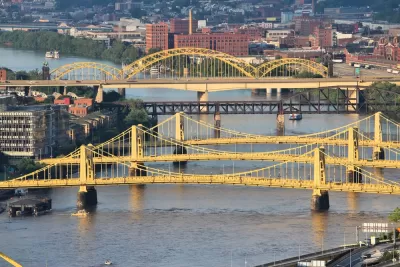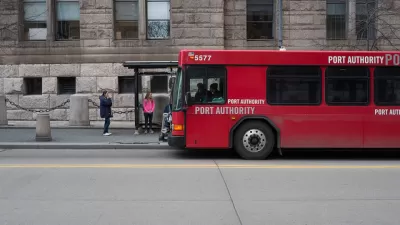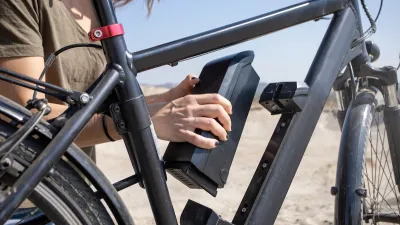The collective of micromobility and shared mobility operators is tasked with developing an integrated system that would better serve the diverse needs of travelers.

Laura Bliss reports on the Pittsburgh Mobility Collective, a consortium of mobility service providers that is working to provide multiple services through one platform. Participants include Spin, Zipcar, Ford Mobility, Waze, Swiftmile, and the Transit app.
Pittsburgh’s transportation department had issued a request for plans that would provide car-free travel alternatives:
[The Mobility Collective’s] winning plan, which was one of five submissions, envisions "mobility hubs" clustered near transit stops throughout Pittsburgh. There, travelers would find some combination of bike-share stations, Zipcar vehicles, Waze carpool pickup spots, and parked and charged e-bikes and scooters from Spin to rent. The Transit app would handle route planning and ticketing services to customers, and Ford Mobility would feed data analytics back to the city.
Bliss reports that the project is bringing together companies that in most other contexts operate as competitors. But Pittsburgh officials particularly wanted bundle services for travelers who might face challenges accessing and using existing individual services.
The city is offering the participating companies some incentives, reports Bliss. "For one, the city is keeping other mobility competitors out of play for the time being, according to [Karina] Ricks. And two, her department will work closely with the collective to remove obstacles to their success on the street."
FULL STORY: A Micromobility Experiment in Pittsburgh Aims to Get People Out of Their Cars

Study: Maui’s Plan to Convert Vacation Rentals to Long-Term Housing Could Cause Nearly $1 Billion Economic Loss
The plan would reduce visitor accommodation by 25,% resulting in 1,900 jobs lost.

North Texas Transit Leaders Tout Benefits of TOD for Growing Region
At a summit focused on transit-oriented development, policymakers discussed how North Texas’ expanded light rail system can serve as a tool for economic growth.

Using Old Oil and Gas Wells for Green Energy Storage
Penn State researchers have found that repurposing abandoned oil and gas wells for geothermal-assisted compressed-air energy storage can boost efficiency, reduce environmental risks, and support clean energy and job transitions.

From Blight to Benefit: Early Results From California’s Equitable Cleanup Program
The Equitable Community Revitalization Grant (ECRG) program is reshaping brownfield redevelopment by prioritizing projects in low-income and environmental justice communities, emphasizing equity, transparency, and community benefits.

Planting Relief: Tackling Las Vegas Heat One Tree at a Time
Nevada Plants, a Las Vegas-based nonprofit, is combating the city’s extreme urban heat by giving away trees to residents in underserved neighborhoods, promoting shade, sustainability, and community health.

How Madison’s Tree Planting Efforts Are Growing a Healthier Community
Madison’s annual tree planting initiative is enhancing environmental resilience, public health, and community livability by adding 1,400 carefully selected trees citywide, with strong community and institutional support for urban forestry.
Urban Design for Planners 1: Software Tools
This six-course series explores essential urban design concepts using open source software and equips planners with the tools they need to participate fully in the urban design process.
Planning for Universal Design
Learn the tools for implementing Universal Design in planning regulations.
Ascent Environmental
Borough of Carlisle
Institute for Housing and Urban Development Studies (IHS)
City of Grandview
Harvard GSD Executive Education
Toledo-Lucas County Plan Commissions
Salt Lake City
NYU Wagner Graduate School of Public Service





























